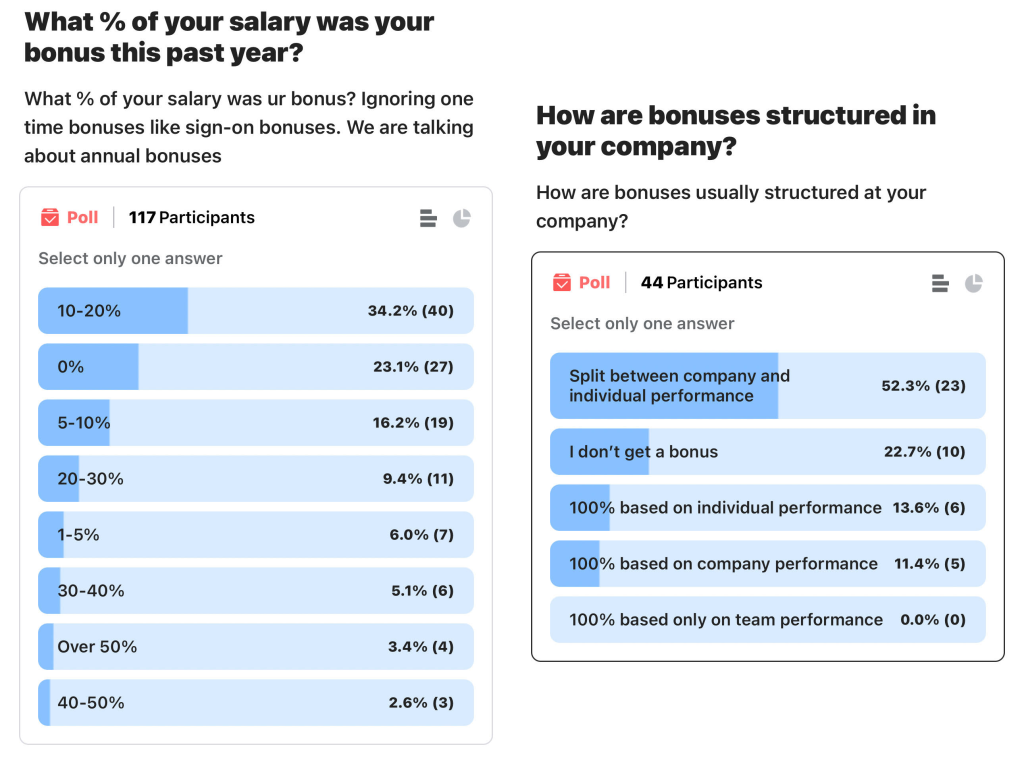Bonuses. It’s a win-win, right? Employees only get paid when they achieve their individual goals, and when the company achieves theirs. And they’re considered a “must have” in industries like tech. In fact, according to a recent Blind poll, up to 77% of tech companies give out bonuses to their employees, with the the majority of these bonuses making up 10-20% of an employees’ salary.

But should you follow the herd? Should you really give bonuses to your team?
I faced this same question when I was an engineering leader at a startup years ago. To give you some context, our team had grown to a fairly decent size (15-20). We paid everyone a fair market salary, but we wanted to motivate them to work even harder. Since most of the leadership team came primarily from a finance background, we thought why not implement a bonus? Wall Street does it, why not us?
So we decided to do a 1-year trial. We set it up such that if they completed every single item on our roadmap, they would get a pretty decent 20% bonus. Realistically, we thought it would take maybe 15 months to complete everything, but if they worked really hard, they had a chance to earn a bonus. Sounds straightforward, right? Give them stretch goals and reward them if they actually achieve them.
We did this for a year. And by the end, it was a complete disaster. Here’s what happened:
- Burnout
When we first told our team about the bonus structure, everyone was pretty happy. After all, they had the opportunity to get paid extra. Free money! People started to work a hour earlier, and stayed a hour later. You could tell that they were more motivated! But after 6-8 months, burnout started to creep in. Soon instead of working an extra hour, people started to work 2-3 extra hours in the evening, and even a few hours on the weekend. Work-life balance completely fell apart as people felt pressure to complete everything by the deadline and get that bonus.
- Collaboration went down hill
This was a little hard to measure, but I could feel there was a tangible drop off in collaboration. People became laser focused on their work, which was good. But they also would refuse to spend any significant amount of time supporting other teams. If someone from marketing asked a question about something, it would take a few days for someone to answer, when it would typically take a few hours. In addition, BAU (business as usual) work got put in a stockpile because nobody’s bonuses depended on completing it. Bugs started to creep into our product, and nobody wanted to take time away from their day to fix them.
- Quality of work started to go down, especially near the end
As the end of the year, the quality of work started to really deteriorate. People were rushing to get their projects done in time, and more and more bugs started to appear in our codebase. The project was eventually “done” by the end of the year, but a lot of corners were cut, and it resulted in a lot of technical debt we had to fix down the line.
- Jealousy/bitterness in teams that did not get paid a bonus.
While we did pay out bonuses to all our engineers at the end of the year, there was definitely some bitterness in other teams who were *not* paid a bonus. In hindsight, I would’ve been bitter too. After all, they also did work that were integral to our company’s success, but just wasn’t very visible (ie teams that worked on internal tools, or dashboards). And they understandably felt bitter about not getting recognized for it.
While my experience with giving bonuses certainly won’t apply to everyone, I think it’s not a clear cut decision. And no matter how you structure it, there will always be problems.
For instance, instead of dictating the goals for employees, why not let the employees decide what goals to set for the year? And pay the bonus to them if they complete those goals? However, this can lead to people setting safer, less ambitious targets and being ultra-conservative. Paying a bonus based on personal goals is also based on the assumption those goals remain static. But that’s a false assumption. After all, business requirements are never static. What happens if a competitor comes out with a feature, and all your customers are clamoring for you to build it? Will your team will adapt quickly to a shift in direction if it endangers their bonus?
Paying a bonus can ultimately lead to a conflict where employees simply focus on their personal goals, instead of what’s best for the company as a whole.
The Disillusionment with Company-wide Goals
Shifting the entire bonus structure to depend solely on company-wide goals is not a solution either. After all, many employees have roles that have little impact on the company’s bottom line. And it has nothing to do with talent or motivation. I’ve met many intelligent, ambitious people who unfortunately are stuck in low-level roles with no say in the company’s direction. They do their jobs extremely well, but because of bad decisions from management, their work just doesn’t impact the bottom line. So basing your bonus structure on company performance can have the opposite effect: it can lead to a sense of powerlessness.
So, what should you consider instead of bonuses?
- Increase base salary instead
Rather than reward short-term performance, which can lead to the wrong incentives, simply pay everyone a higher salary. This provides more stability and rewards building long-term skills, and helping the company with their long-term goals. It also increases retention because employees feel secure in how their hard work will translate to pay every year. Whereas, if you have an annual bonus, you’ll often see groups of employees leave *the day after* those bonuses are paid. After all, there’s no guarantee they’ll get paid that bonus next year, so why stick around if there’s an offer with a higher salary?
2. Have an opaque bonus structure or give spot bonuses
There’s an argument for making bonus structures opaque, where employees are unaware of how bonuses are calculated. While this approach might seem to simplify the process, it can also lead to a lack of transparency and trust. Employees might feel that bonuses are given out arbitrarily.
A better alternative is giving “spot bonuses” or one-time equity rewards. This could be a thoughtful way of showing appreciation to an employee. It’s also a reward that isn’t expected (ie if you do this, you’ll get this). Because of that, it’s a more genuine form of appreciation.
Alternatively, if the company had a really good year (I’m looking at you, Nvidia), you could give distribute a flat $ amount or % of salary to every employee as a form of appreciation. But don’t call it a bonus, just a distribution. Things like these can build goodwill, and increase retention.
3. Have peer to peer recognition programs
This isn’t a popular option, but I know of a few companies that have implemented peer-to-peer recognition programs. Employees receive a monthly allowance to reward colleagues. This can definitely foster a collaborative culture. However, you do need to be mindful of potential challenges such as collusion or favoritism.
What if you insist on having a bonus?
While I’m against bonuses, there are some key things to follow if you insist on having one. 1 is to have very clear guidelines for what success looks like, and you need to clearly communicate those guidelines. Be specific. For instance, instead of saying the company needs to grow 20%, say “the company needs to grow non-GAAP revenue by 20% by the end of the year”. And have it documented somewhere. Otherwise, you risk employees feeling disgruntled when they felt they were due a bonus, but not receiving them because they misjudged how they/the company performed.
Secondly, make sure the bonus is really additional compensation, not an expected form of compensation. A bonus should ideally be extra compensation on top of an already fair salary, rather than a slightly lower base salary, supplemented with a bonus.
Subscribe to get more data-driven research on hiring, labor and AI trends
Future articles will include: outsourcing trends, our best attempt to use data to find out which careers are least likely to be replaced by AI, and more! No fluff, no armchair predictions, just refreshing research backed by DATA






